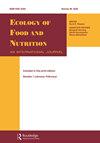Alternative caregivers` role in food choices for young children in semi-urban and urban Mexico.
IF 1.3
4区 医学
Q4 NUTRITION & DIETETICS
Ecology of Food and Nutrition
Pub Date : 2022-11-01
Epub Date: 2022-10-17
DOI:10.1080/03670244.2022.2134996
引用次数: 0
Abstract
ABSTRACT Alternative caregivers (i.e., someone besides the primary caregiver who also takes care of children) make food choices for children. This study investigated what alternative caregivers consider when making food choices for children and their perspectives on their role in making food choices to feed children. In-depth interviews were conducted with 16 alternative caregivers of children aged 1–5 years old in semi-urban and urban areas of the State of Mexico in Mexico. Interviews were recorded, transcribed, coded, and analyzed using constant comparative method. Alternative caregivers described spaces and situations that exposed children to food while under their care. Alternative caregivers who spent longer periods of time with the child described more involvement in what the child ate. Healthy or nutritious food, cost of food and affection for children were important considerations for alternative caregivers when deciding what to feed the child. Alternative caregivers had a substantial role in child feeding, decisions about cooking, and advising mothers on how to feed their children. Efforts to promote healthy food choices for children should include targeting of alternative caregivers.替代照顾者在墨西哥半城市和城市幼儿食物选择中的作用。
替代照顾者(即除了主要照顾者之外还照顾儿童的人)为儿童选择食物。本研究调查了其他照顾者在为儿童选择食物时所考虑的因素,以及他们在为儿童选择食物时所扮演的角色。对墨西哥墨西哥州半城市和城市地区16名1-5岁儿童的替代照料者进行了深入访谈。访谈记录,转录,编码,并使用恒定的比较方法进行分析。替代照顾者描述了在他们的照顾下儿童接触食物的空间和情况。与孩子相处时间较长的替代照顾者描述了更多地参与孩子的饮食。健康或有营养的食物、食物的价格和对儿童的关爱是替代照料者在决定给儿童喂食时的重要考虑因素。替代照顾者在喂养孩子、决定烹饪和建议母亲如何喂养孩子方面发挥了重要作用。促进儿童选择健康食品的努力应包括以替代照顾者为目标。
本文章由计算机程序翻译,如有差异,请以英文原文为准。
求助全文
约1分钟内获得全文
求助全文
来源期刊
CiteScore
3.50
自引率
0.00%
发文量
23
审稿时长
>12 weeks
期刊介绍:
Ecology of Food and Nutrition is an international journal of food and nutrition in the broadest sense. The journal publishes peer-reviewed articles on all aspects of food and nutrition -- ecological, biological, and cultural. Ecology of Food and Nutrition strives to become a forum for disseminating scholarly information on the holistic and cross-cultural dimensions of the study of food and nutrition. It emphasizes foods and food systems not only in terms of their utilization to satisfy human nutritional needs and health, but also to promote and contest social and cultural identity. The content scope is thus wide -- articles may focus on the relationship between food and nutrition, food taboos and preferences, ecology and political economy of food, the evolution of human nutrition, changes in food habits, food technology and marketing, food and identity, and food sustainability. Additionally, articles focusing on the application of theories and methods to address contemporary food and nutrition problems are encouraged. Questions of the relationship between food/nutrition and culture are as germane to the journal as analyses of the interactions among nutrition and environment, infection and human health.

 求助内容:
求助内容: 应助结果提醒方式:
应助结果提醒方式:


